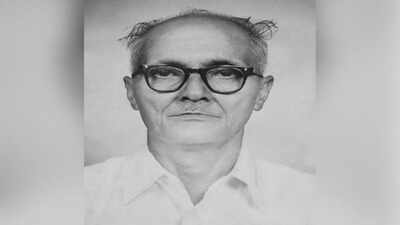Top Searches
- News
- India News
- Narayan Dutta: Unsung hero who organised secret camps for volunteers of freedom struggle in Assam
Narayan Dutta: Unsung hero who organised secret camps for volunteers of freedom struggle in Assam

Narayan Chandra Dutta
NEW DELHI: Born in 1910, Narayan Chandra Dutta had the spirit of freedom since his childhood and fought for India's independence from British colonial rule. During his school days, Dutta participated in the Horse Race Competition at the Gymkhana Club in Jorhat, Assam against British officials. He was a student at Jorhat Christial School.
Narayan Chandra Dutta was put in charge of Barkathoni Satyagraha Ashram in Golaghat, which was founded after Mahatma Gandhi began the Civil Disobedience Movement. Bapu began his defiant march to the sea to break the British monopoly on salt on March 12 1930. Dutta arranged for food, health and wellness, treatment, training and movement of the satyagrahis of the Barkathoni Ashram.
The Barkatoni Satyagraha Ashram, among few others in Golaghat, was established by satyagrahi Sankar Chandra Barua for the propagation of truth and non violence among the satyagrahis. The ashram's aim was also to propagate the Civil Disobedience Movement and the swadeshi concept of spinning thread out of cotton.
Barua's growing swadeshi activities came to the notice of the British administration. Soon after, the British government announced an award to anyone for the severed head of Sankar Barua and any freedom fighter supporting him was considered the enemy of the British administration. The British spies were at work to trace out satyagrahis of the Quit India Movement. Despite the announcements of the British administration against Barua, Narayan Chandra Dutta sheltered him in his house in order to keep alive the India's struggle for freedom in Golaghat.
The British police, on several occasions, entered Dutta's house in search of Sankar Chandra Barua and also tortured and ill-treated him by inflicting punishments. Anticipating further threats, Dutta had kept secret documents of the Freedom Movement beneath the roots of bamboo plantations in his yard. He had also organised secret camps for the volunteers of the freedom struggle on the bank of Doiyang river in Assam during the Quit India Movement.
Dutta openly resisted the selling of opium among the locals by the British, for which he faced atrocities of the British police. The fearless satyagrahi was beaten and even arrested.
During the outbreak of Kala-Azar at Golaghat in 1945-46, Dutta played a pivotal role in the society arranging for the treatment and care of the patients of Furkating, Rupkolia Gaon and Ulutoli Gaon in Assam.
Narayan Chandra Dutta dedicated his life not only to the freedom struggle but also dedicated his life for educational and cultural promotion of the locality of Golaghat region in Assam.
Narayan Chandra Dutta was put in charge of Barkathoni Satyagraha Ashram in Golaghat, which was founded after Mahatma Gandhi began the Civil Disobedience Movement. Bapu began his defiant march to the sea to break the British monopoly on salt on March 12 1930. Dutta arranged for food, health and wellness, treatment, training and movement of the satyagrahis of the Barkathoni Ashram.
The Barkatoni Satyagraha Ashram, among few others in Golaghat, was established by satyagrahi Sankar Chandra Barua for the propagation of truth and non violence among the satyagrahis. The ashram's aim was also to propagate the Civil Disobedience Movement and the swadeshi concept of spinning thread out of cotton.
Barua's growing swadeshi activities came to the notice of the British administration. Soon after, the British government announced an award to anyone for the severed head of Sankar Barua and any freedom fighter supporting him was considered the enemy of the British administration. The British spies were at work to trace out satyagrahis of the Quit India Movement. Despite the announcements of the British administration against Barua, Narayan Chandra Dutta sheltered him in his house in order to keep alive the India's struggle for freedom in Golaghat.
The British police, on several occasions, entered Dutta's house in search of Sankar Chandra Barua and also tortured and ill-treated him by inflicting punishments. Anticipating further threats, Dutta had kept secret documents of the Freedom Movement beneath the roots of bamboo plantations in his yard. He had also organised secret camps for the volunteers of the freedom struggle on the bank of Doiyang river in Assam during the Quit India Movement.
Dutta openly resisted the selling of opium among the locals by the British, for which he faced atrocities of the British police. The fearless satyagrahi was beaten and even arrested.
During the outbreak of Kala-Azar at Golaghat in 1945-46, Dutta played a pivotal role in the society arranging for the treatment and care of the patients of Furkating, Rupkolia Gaon and Ulutoli Gaon in Assam.
Narayan Chandra Dutta dedicated his life not only to the freedom struggle but also dedicated his life for educational and cultural promotion of the locality of Golaghat region in Assam.
FOLLOW US ON SOCIAL MEDIA
FacebookTwitterInstagramKOO APPYOUTUBE
Start a Conversation
end of article










